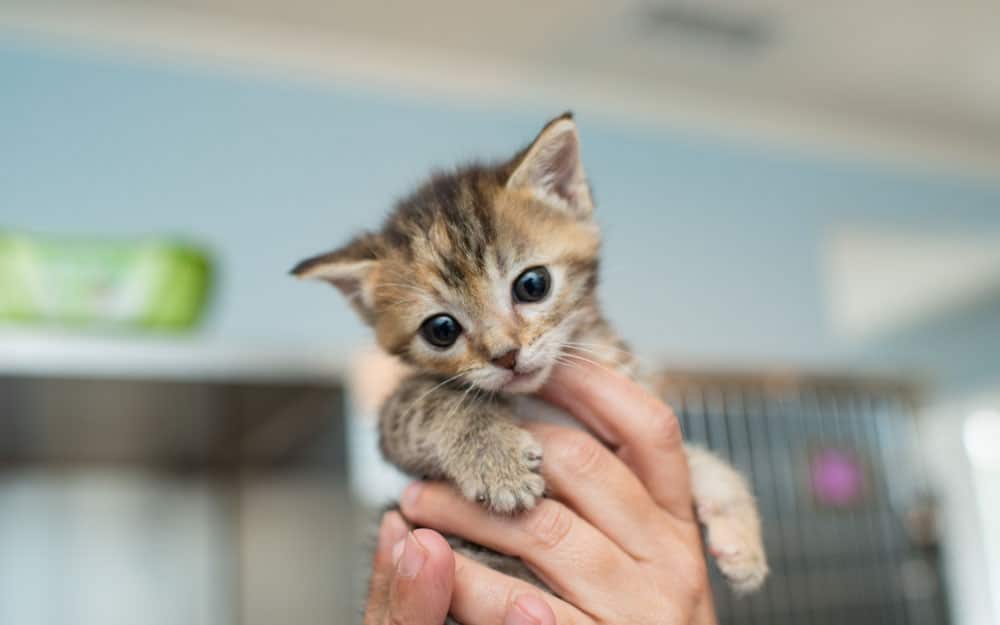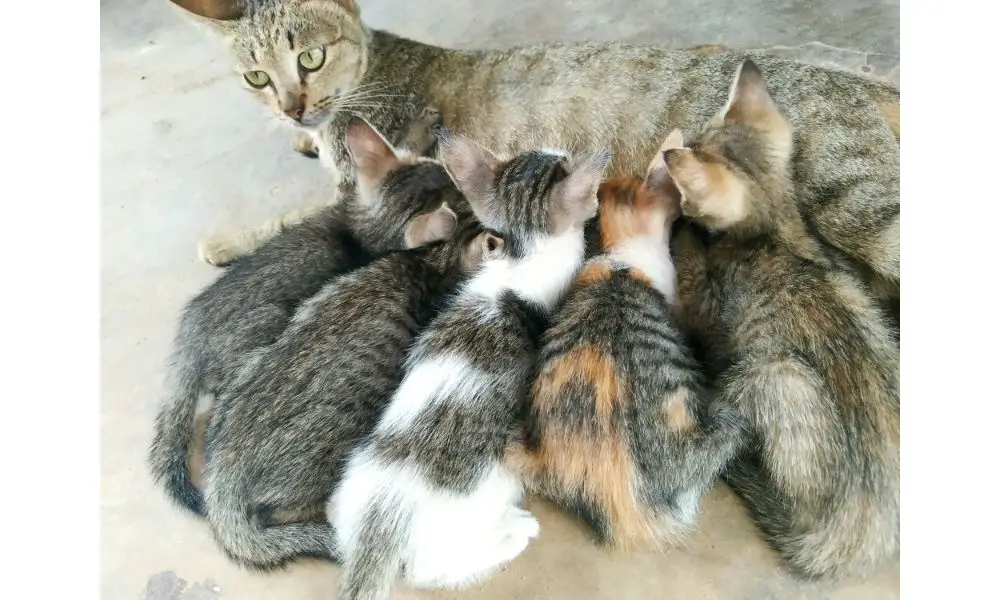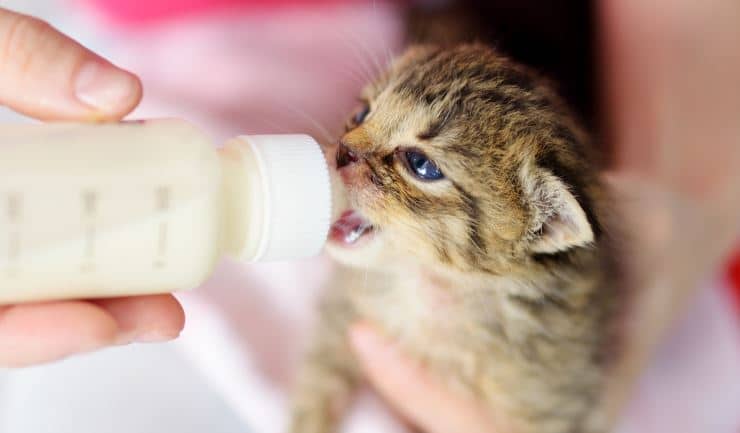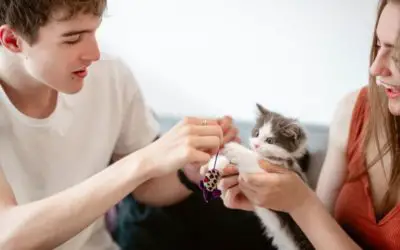It’s both one of the most difficult and rewarding experiences you can have as a cat parent: raising one or multiple kittens. But orphaned kittens have very special needs, and many things to learn from a mother that is no longer present.
Today, we’re inviting Veterinary writer Greg Steele to guide us through the care of newborn kittens. In part one, Vet Greg covers the crucial first four weeks of life.
- When should I intervene to help a queen and kittens?
- Hand-rearing a kitten: What should I think about before raising a kitten?
- Raising Orphaned Kittens: What do I need to take care of abandoned kittens without a mother?
- My cat gave birth: How do I take care of kittens 1-4 weeks old with a mother?
- What health issues should I look for when caring for abandoned kittens?
Once you’ve adopted a kitten, your life will never be the same! These little bundles of fur will bring you endless pleasure and a lasting connection. However, taking care of kittens without a mom is not easy. So, you will want to make sure you are well-prepared for the task.
If your kitten was separated from her mother at an early stage, she will likely be quite fearful of the world and her surroundings. It is now your job to facilitate her growth into a healthy adult.
Cat-moms (also known as queens) usually take complete care of their kittens for the first few months of life. In most cases, litters are born and raised without any issues. However, problems can arise when a mother and her babies are separated. In these instances, you may find yourself having to raise orphaned or stray kittens on your own. Taking care of kittens is a full-time job but it is also one of the most rewarding experiences you can have as a pet owner. Most kittens thrive when they are looked after properly.
When should I intervene to help a queen and kittens?
Wherever possible, it’s best for kittens to be brought up by their mother. This way, they will get the right nutrition, socialization, and care they need to grow into healthy adults. In some cases, a queen may not be able to (fully) look after her offspring. So, the owner(s) may need to step in to take care of the kittens or lend her a hand.
Situations like these can arise if a queen has had a very large litter. They can also be caused by a traumatic birth experience (long, complicated, or requiring caesarian section surgery). Furthermore, mother cats can develop mastitis just like humans, which can make it painful for her to feed her kittens. In all of these cases, the kittens can usually be left with their mother, and just offered some additional supplemental care. However, if your queen is not alert, eating, and feeding her kittens, you should seek professional veterinary advice right away.
Problems during growth
In rare instances, kittens can be born with health issues. These kittens often do not grow and thrive as they should, despite the best efforts of the mom. If you suspect a birth defect, it is worth seeking the opinion of a professional veterinarian.
Stray kittens
The worst case scenario for kittens is if the queen abandons them or passes away before they are fully weaned. These kittens are considered to be orphaned and will not survive without attentive care. Kittens found in these circumstances will need full hand-rearing to ensure they survive.

Hand-rearing a kitten: What should I think about before raising a kitten?
Before deciding to hand-raise stray or abandoned kittens, you should seek professional veterinary advice. A vet will be able to tell you more about the overall health of the kittens and guide you on how to proceed with their care.
It is important to remember three things when hand-rearing kittens:
- Ethical issues: It may not be ethical to hand-rear a kitten with severe health problems. You should speak to a vet if you are concerned.
- The risk of behavioral problems: Hand-reared kittens are more at risk of developing behavioral problems later in life. This could make them harder to look after or difficult to re-home as adults.
- It’s a 24-hour job: Hand-rearing is extremely hard work. Kittens require full-time dedication and commitment so you must be prepared to put in the effort.
If you’re still keen to take care of abandoned kittens, then read on. If not, consider reaching out to a local shelter for help.
Raising Orphaned Kittens: What do I need to take care of abandoned kittens without a mother?
Below are the most important elements you need to consider when raising abandoned kittens:
Provide newborn kittens with a clean, warm, and dry environment
Firstly, you will need to provide your kittens with a suitable, enclosed bedding area to keep them safe. A queening box or a large cat carrier work well. Kittens of this age are incredibly vulnerable so you will need to keep them away from other animals.
Young kittens are susceptible to the cold so maintaining a constant temperature is essential. The nest temperature should be between 85 to 90 °F (29 to 32 °C) for the first 2 weeks of life. Then reduced to 27°C at 2 weeks. When your kittens reach 4-weeks old, the temperature can be reduced again to 22°C. A heat source can be provided for kittens by using a covered hot water bottle, heat pad, or heat lamp. The temperature can be maintained by providing plenty of bedding. However, you should refrain from using too many blankets as young kittens can get tangled in them. A soft pet bed is a safer choice.
Check the temperature in the nest regularly to make sure it doesn’t get too hot. You can use a reliable thermometer for this. You will also need to make sure the kittens can escape from the heat if they need to by providing a cooler and a warmer end of the nest.
Feeding your kittens regularly and with the correct products
Young kittens need 8-10 feeds in each 24 hour period, spread 2-3 hours apart. Kittens have specific dietary requirements so you should speak to a professional veterinarian to determine the best milk replacer to use. Make sure you follow the instructions carefully, as incorrect mixing can cause digestive problems. You should also ensure you keep your kitten formula at the correct temperature.

Be careful and gentle when feeding kittens. There are a number of different methods you can use so, do your research first. Under-feeding, over-feeding, and incorrect feeding can all be dangerous. If kittens inhale milk or it goes down the wrong way, it can lead to a lung infection (pneumonia) or drowning. Persian kittens and similar breeds with flatter faces (brachycephalic) are most vulnerable to this.
Be careful and gentle when feeding kittens. There are a number of different methods you can use so, do your research first. Under-feeding, over-feeding, and incorrect feeding can all be dangerous. If kittens inhale milk or it goes down the wrong way, it can lead to a lung infection (pneumonia) or drowning. Persian kittens and similar breeds with flatter faces (brachycephalic) are most vulnerable to this.
Your local veterinary practice will have plenty of experience in raising kittens and should be able to show you how to safely feed them. Alternatively, a nearby shelter may be able to help.
Keeping equipment clean to prevent disease
Equipment used to feed kittens should be regularly cleaned and sterilized, just as they would for a human baby. Infections are a serious risk so good hygiene is essential. Follow the cleaning instructions for your kittens bottle (and any other equipment) carefully, as different materials need to be sterilized in different ways. Boiling water, microwave ovens and sterilizing tablets may all be recommended, depending on the item.
Helping orphaned kittens to toilet
Kittens cannot go to the toilet (either urinating or defecating) by themselves until they are around 2-3 weeks old. Usually, their mother will stimulate them by licking their bottoms under the tail. When kittens have no mother, it’s important that you do this for them, otherwise they can become seriously ill.
To stimulate a young kitten, gently rub a damp soft tissue or cotton wool around the bottom. It is worth doing this before and after each feed. Again, your local shelter or veterinary practice will be able to show you how to do this if you are unsure.
From around 3 weeks of age, kittens should learn to go to the toilet by themselves. So, you can start training them to use a litter tray. To begin with, you should carefully place your kittens in the tray and then stimulate them as before. After a while, they will work it out on their own. Although, a small amount of soiled litter may remind them of what they need to do!
My cat gave birth: How do I take care of kittens 1-4 weeks old with a mother?

If the mom is still present, your job will be a lot easier! Ensure the mum has a safe space to raise her kittens that is away from other animals in the house. A box with high sides is important as it will prevent the kittens from falling out. If you are raising orphaned kittens, a large carrier or specially made queening box will do the trick. After the mother has given birth, she should instinctively clean and dry the kittens herself. If she doesn’t, a quick rub with a dry towel may help the process along. Keeping the room temperature warm helps, too.
You will need to keep a close eye on the kittens for the first few weeks to make sure they are all feeding properly. You can do this by weighing them regularly to ensure they are gaining weight. Within the first week, kittens should double their birth weight, then continue to gain weight steadily. If you suspect a problem with feeding, speak to a veterinarian as they will be able to identify any underlying problems such as mastitis or the development of a cleft palate. You may simply just need to ‘top-up’ the kittens with a little milk replacer if the queen is struggling.
What health issues should I look for when caring for abandoned kittens?
In the first few weeks, healthy kittens should eat or sleep for 90% of the time, and generally appear relaxed. If you are concerned at all, it is important to consult a veterinarian as soon as possible because kittens can deteriorate very quickly. After birth, the umbilical cord should dry up and fall off after a few days and kittens will usually open their eyes at around 1-2 weeks of age.
Low Blood Sugar in Kittens
If kittens are not receiving enough food, they can develop low blood sugar. This usually manifests as severe depression, muscle twitching, and convulsions. If you see any of these symptoms in your kittens, you will need to see a vet immediately. Kittens with low blood sugar have no energy reserves so will deteriorate very quickly, Sugary solutions placed on the tongue may help in an emergency, but the underlying problems need to be corrected for the kitten to survive.
Constipation in Hand-Reared Kittens
Constipation is very common in hand-reared kittens, as it is difficult to replicate the mother’s regular stimulation behavior. It appears as solid-looking feces (normal feces are more like toothpaste) and excessive straining. If the kitten does not poop for more than 2-3 days, small amounts of laxative may be required. It’s best to talk to your veterinarian about this to determine the best product to use and how to administer it.
Diarrhea in Kittens
Diarrhea in kittens can be very serious and has numerous potential causes. It is very easy for kittens to develop low blood sugar and dehydration when they have a bout of diarrhea, so treatment must be speedy! Fake antibiotics and out-of-date antibiotics can cause problems, so antibiotics should only be used if there is an infection. Never give any treatment without first seeking the advice of a veterinarian.
What else do I need to consider as my kittens get older?
As your kittens open their eyes and start to move around, you will notice them becoming much stronger and more mobile. At this stage, you will need to start giving them space to explore, especially if their ‘nest’ is quite small.
All kittens need regular worming from 3 weeks of age. They will also need their first set of vaccinations at around 8-9 weeks old. A veterinarian will be able to go through this with you in more detail.
Socialization
Kittens need to be appropriately socialized to prevent behavioral problems developing. So it is worth introducing them to different handling techniques, sights, sounds, and smells as regularly as possible. In an ideal environment, kittens learn all the skills they need from their mother and siblings. However, orphaned kittens can struggle to learn cat language. This is especially true of kittens that have been raised alone.
Socialization should include introductions to other people and animals. However, you need to make sure all meetings are safe for everyone involved, and are always positive. Kittens and puppies should learn to tolerate each other if they are introduced carefully in the first 2-7 weeks of their lives.

A Vet’s Advice for Hand-Rearing Kittens
Hand-rearing kittens is a big commitment, whether you are helping the mother or replacing her entirely. There are lots of bases to cover and problems to watch out for. However, with hard work and determination it can be done successfully.
Always seek professional veterinary advice if you are in any doubt. If you’ve made it this far, well done! Your kittens are now weaning! After roughly four weeks, kittens enter a second stage of growth as they begin to eat solid foods. To find out more, head over to the second article in this series.





Do you think a very calm spayed female cat who has had kittens before can assist with rearing of another litter of kittens? Obviously not feeding but grooming, keeping warm, behaviour, stimulating to defecate, etc?
I have recently started reading your blog, and the info you provide in the articles
has helped me tremendously with my cat. Thank you Catpointers!